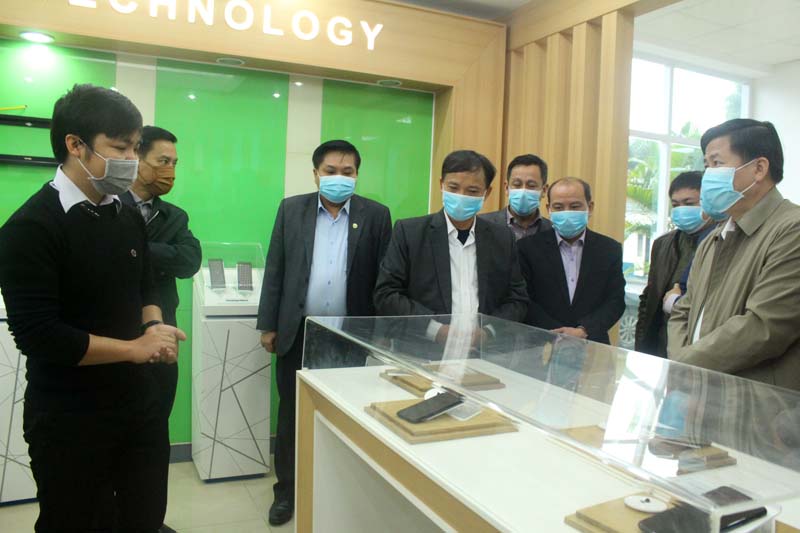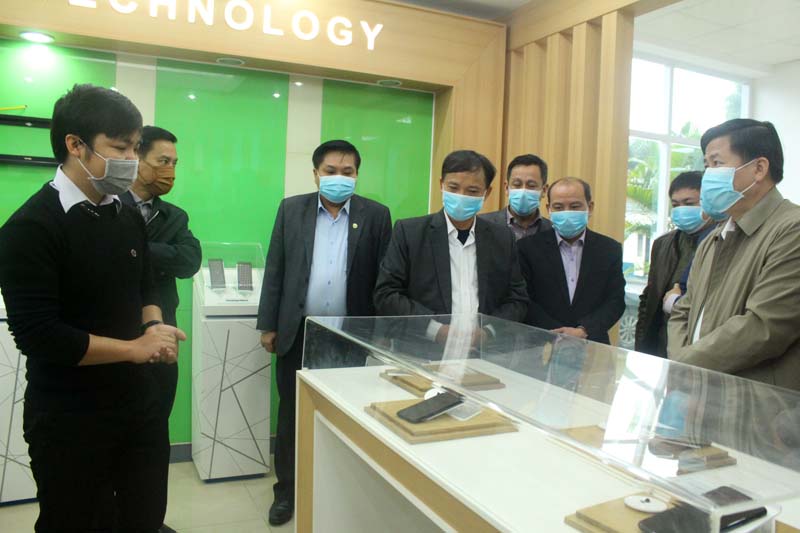
(HBO) – A delegation of the People’s Committee of Hoa Binh province on February 4 visited some businesses at the Luong Son Industrial Park in Luong Son district on the occasion of the Lunar New Year festival.
 Bui Van Khanh, Chairman
of the provincial People’s Committee, and his entourage visit a showroom of
high-quality products of HNT VINA Co., Ltd.
Bui Van Khanh, Chairman
of the provincial People’s Committee, and his entourage visit a showroom of
high-quality products of HNT VINA Co., Ltd.
The
Luong Son Industrial Park has attracted 40 investment projects, including 16
foreign-invested ones valued at 246.7 million USD and 24 domestic projects
worth over 3.56 trillion VND.
The
projects have generated jobs for more than 14,500 labourers, mainly locals,
each with an average monthly salary of 5 million VND. Last
year, most of the companies in the park completed their production and business
targets.
The
delegation visited Esquel Garment Manufacturing Vietnam-Hoa Binh Co., Ltd and
An Thinh Real Estate JSC where they were briefed on the businesses’
production-business performance in 2019, tasks for 2020 and prevention and
control of the acute respiratory disease caused by the new coronavirus (2019 - nCoV).
Bui
Van Khanh, Chairman of the provincial People’s Committee, noted with pleasure
the continuous development of these firms, contributing to local economic
growth, budget collection and job generation.
He
also lauded these enterprises’ efforts to ensure material and spiritual life of
labourers during the Lunar New Year (Tet) festival, as well as their prompt
response to the new virus.
Chinese
labourers who returned to work in three businesses in the park after spending
the Tet holiday in their home country have been isolated in line with
regulations.
On
this occasion, Khanh visited the staff of the provincial customs department
that was asked to seek practical solutions to help businesses in the locality
deal with difficulties in product supply and material import caused by impacts
of the epidemic./.
According to data from the Hoa Binh Provincial Party Committee, the industrial production index for the first six months of 2025 is estimated to have increased by 20% compared to the same period last year. This marks the highest year-on-year growth rate for this period since 2020.
In the first six months of 2025, Hoa Binh province’s export turnover was estimated at 1.145 billion USD, marking an 18.11% increase compared to the same period in 2024. Import turnover was estimated at $ 804 million, a 17.15% increase, which helped the province maintain a positive trade balance.
The lives of the ethnic minority farmers in Tan Lac district have gradually improved thanks to the new directions in agricultural production. This is a testament to the collective strength fostered through the professional associations and groups implemented by various levels of the district’s Farmers’ Union.
With the motto the "product quality comes first,” after nearly one year of establishment and operation, Muong village’s Clean Food Agricultural and Commercial Cooperative, located in Cau Hamlet, Hung Son Commune (Kim Boi district), has launched reputable, high-quality agricultural products to the market that are well-received by consumers. The products such as Muong village’s pork sausage, salt-cured chicken, and salt-cured pork hocks have gradually carved out a place in the market and they are on the path to obtaining the OCOP certification.
In the past, the phrase "bumper harvest, rock-bottom prices" was a familiar refrain for Vietnamese farmers engaged in fragmented, small-scale agriculture. But today, a new spirit is emerging across rural areas of Hoa Binh province - one of collaboration, organisation, and collective economic models that provide a stable foundation for production.
Maintaining growing area codes and packing facility codes in accordance with regulations is a mandatory requirement for agricultural products to be eligible for export. Recently, the Department of Agriculture and Environment of Hoa Binh province has intensified technical supervision of designated farming areas and packing facilities to safeguard the "green passport" that enables its products to access international markets.



 Bui Van Khanh, Chairman
of the provincial People’s Committee, and his entourage visit a showroom of
high-quality products of HNT VINA Co., Ltd.
Bui Van Khanh, Chairman
of the provincial People’s Committee, and his entourage visit a showroom of
high-quality products of HNT VINA Co., Ltd.